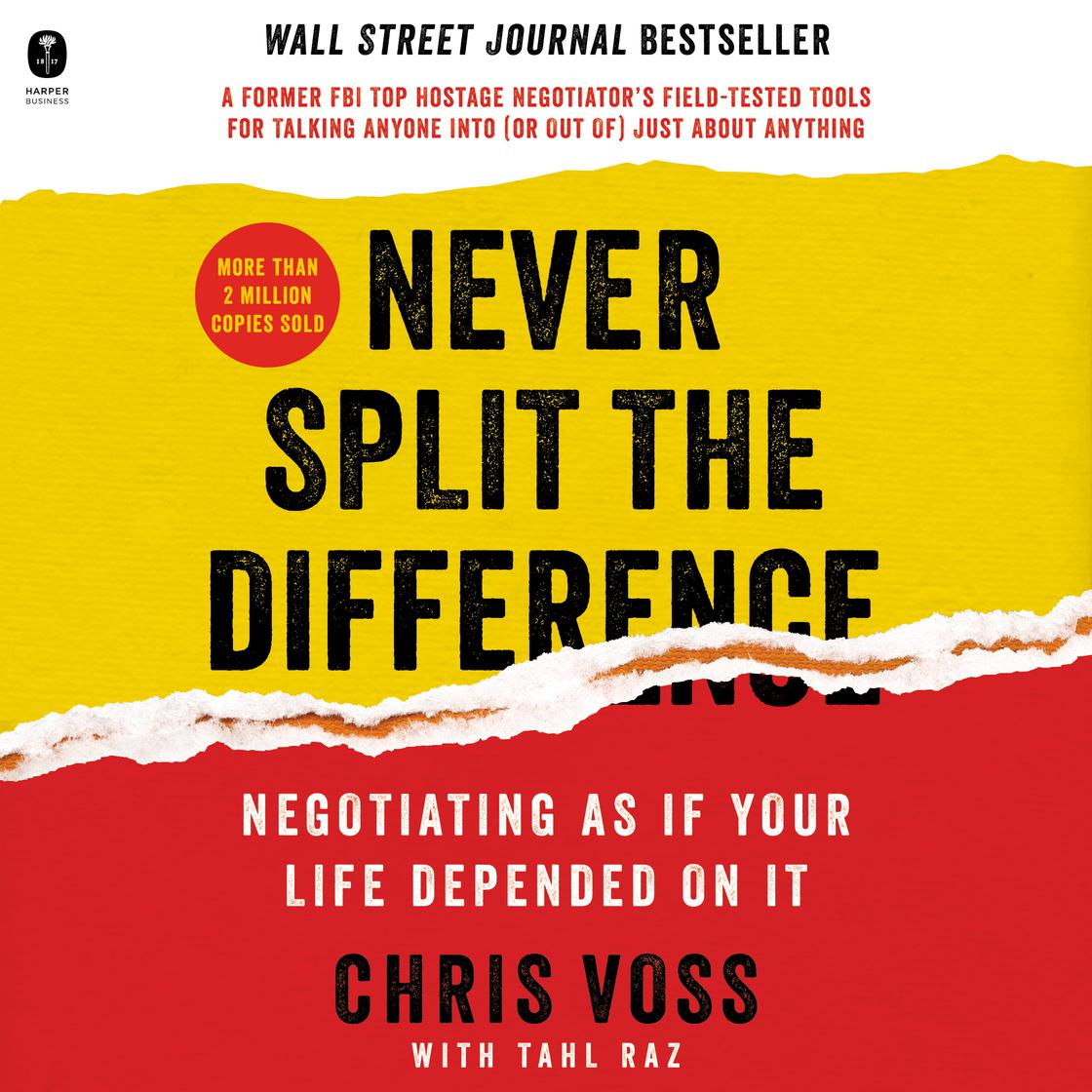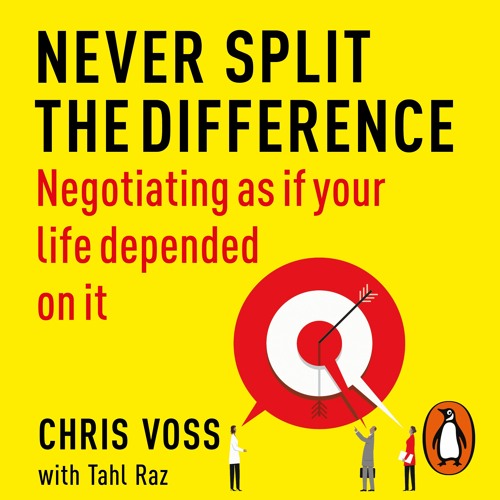“Never Split the Difference” by Chris Voss is an insightful guide on negotiation tactics. It teaches techniques used by FBI hostage negotiators.
Chris Voss, a former FBI hostage negotiator, reveals effective negotiation strategies in “Never Split the Difference. ” The audiobook provides practical tips to enhance negotiation skills in personal and professional situations. Voss’s methods focus on understanding human psychology and using empathy to influence outcomes.
He emphasizes the importance of active listening and tactical empathy. The book offers real-life examples and actionable advice, making it a valuable resource for anyone looking to improve their negotiation abilities. Whether negotiating a business deal or resolving a personal conflict, Voss’s techniques can help achieve better results without compromising on key points.

The Art Of Negotiation According To Chris Voss
Negotiation is a crucial skill in both personal and professional settings. In Chris Voss’s audiobook, Never Split the Difference, he shares his expert insights on mastering this art. Voss, a former FBI hostage negotiator, teaches listeners how to achieve success in negotiations without compromise.
Who Is Chris Voss?
Chris Voss is a former FBI hostage negotiator. He has over 20 years of experience in crisis management. Voss has worked on high-stakes situations worldwide. His expertise in negotiation has made him a respected figure in the field.
Voss founded the Black Swan Group, a consulting firm. The firm helps businesses and individuals improve their negotiation skills. Voss’s methods are based on psychological principles and real-world experience.
Key Concepts From The Audiobook
The audiobook Never Split the Difference presents several key negotiation strategies. These strategies are designed to help you get the best outcome in any negotiation.
- Mirroring: Repeat the last few words the other person says. This builds rapport and shows you are listening.
- Labeling: Identify and acknowledge the other person’s feelings. This helps to defuse tension and build trust.
- Accusation Audit: Address any negative assumptions the other person may have. This helps to clear the air and move forward positively.
Voss emphasizes the importance of listening. He advises to use tactical empathy to understand the other person’s perspective. This approach helps to create a collaborative environment.
| Concept | Description |
|---|---|
| Mirroring | Repeat the last few words the other person says. |
| Labeling | Identify and acknowledge the other person’s feelings. |
| Accusation Audit | Address negative assumptions the other person may have. |
Another key concept is the use of open-ended questions. Voss suggests asking questions that start with “What” or “How”. This encourages the other person to explain their position in detail.
- Ask open-ended questions to gather information.
- Use mirroring to build rapport.
- Label emotions to show understanding.
- Conduct an accusation audit to clear negative assumptions.
By following these strategies, you can improve your negotiation skills. Voss’s methods are practical and proven to be effective. Listening to Never Split the Difference will equip you with tools to handle any negotiation.

Tactical Empathy: The Core Of Voss’s Strategy
Chris Voss’s audiobook, Never Split the Difference, explores the power of Tactical Empathy in negotiations. This approach is central to Voss’s strategy and offers invaluable insights into understanding and influencing others. Let’s dive deeper into the concept of Tactical Empathy and see how it can be effectively applied in negotiations.
Understanding Emotional Intelligence
Emotional intelligence is the ability to recognize and understand emotions. It involves being aware of your own feelings and those of others. Chris Voss emphasizes the importance of this skill in negotiations.
He suggests that by understanding what others feel, you can better predict their actions. This knowledge helps you navigate conversations more effectively. Here are some key components of emotional intelligence:
- Self-awareness: Knowing your emotions and their impact.
- Self-regulation: Controlling your emotions and impulses.
- Motivation: Being driven to achieve goals.
- Empathy: Understanding the emotions of others.
- Social skills: Managing relationships to move people in desired directions.
Applying Empathy In Negotiations
Empathy involves understanding and sharing the feelings of others. Chris Voss calls this Tactical Empathy. It means using empathy to gain an advantage in negotiations. Here are some ways to apply Tactical Empathy:
- Active Listening: Pay close attention to what the other person says. Show that you understand their feelings and concerns.
- Mirroring: Repeat the last few words the other person says. This shows that you are listening and encourages them to elaborate.
- Labeling: Identify and verbalize the emotions you observe in the other person. For example, say, “It sounds like you are feeling frustrated.”
- Paraphrasing: Restate what the other person has said in your own words. This confirms your understanding and shows that you are paying attention.
These techniques help build rapport and trust, making the other person more open to your suggestions. By practicing Tactical Empathy, you can navigate negotiations more effectively and achieve better outcomes.
Real-world Applications Of Voss’s Techniques
Chris Voss’s techniques from “Never Split the Difference” are powerful and effective. These strategies can transform both your business and personal negotiations.
Negotiating In Business
In the business world, negotiations are crucial. Voss’s techniques can help achieve better deals. Some key techniques include:
- Mirroring: Repeat the last few words the other person says. This builds rapport quickly.
- Labeling: Identify the other person’s emotions. This helps to address their concerns.
- Accusation Audit: List possible negative thoughts the other party might have. This diffuses potential objections.
These strategies lead to better understanding and stronger agreements.
Negotiating In Personal Life
Negotiation skills are also essential in personal life. Voss’s methods can improve relationships and resolve conflicts.
- Tactical Empathy: Understand and articulate the other person’s feelings. This shows you care about their perspective.
- No-Oriented Questions: Ask questions that prompt a “no” response. This makes the other person feel in control.
- Calibrated Questions: Use open-ended questions that start with “how” or “what.” This helps to gather more information and find solutions.
Applying these techniques can make personal negotiations smoother and more effective.

Conclusion
Chris Voss’s “Never Split the Difference” audiobook is a must-listen for mastering negotiation skills. It provides practical tips backed by real-world experience. By implementing these strategies, you can improve your negotiation outcomes. This audiobook is essential for anyone looking to enhance their communication and negotiation prowess.
Don’t miss out on this valuable resource.



